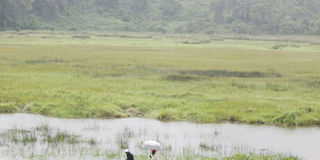The lake protected by a dragon

Lake Nkunga in Meru Town. It is viewed as sacred. PHOTO | DAVID MUCHUI | NATION MEDIA GROUP
What you need to know:
- Lake Nkunga is a key resource for hundreds of elephants that roam Imenti Forest.
- The county government is planning to rehabilitate the lake to establish it as an ecotourism facility.
About 12 kilometres from Meru Town, off the Meru-Nanyuki highway sits crater Lake Nkunga, once a sacred site for the Ameru.
Tucked inside Imenti Forest, the lake was a no-go zone for locals, with only select elders and spiritual leaders visiting the site to offer sacrifices to appease the gods when calamity struck.
It was named Nkunga after a giant dragon that was believed to inhabit the waters.
Ameru legend has it that a giant dragon fell from the sky and created the diverse landscape of valleys and hills in Meru.
It was believed that its eyes were at Lake Nkunga, its huge body on the Nyambene Hills, and its long tail straddled the Tharaka plains.
The myths and oral narratives warned against venturing into the lake because the dragon would swallow anyone.
Lake Nkunga is replenished by underground springs that dot the steep edges of the 96-acre forest.
ANSWERED PRAYERS
Besides its sacred place among the community, Lake Nkunga is also a key resource for hundreds of elephants that roam Imenti Forest.
According to Mr Jack Rutere of Nkunga village, sacrifices conducted at the lake produced instant results.
“The elders would visit the lake whenever there was a crisis and offer sacrifices of millet, honey and sheep. If it was due to drought, it would start raining instantly. That is why it was very important to keep the lake unpolluted,” Mr Ruteere says.
He says elephants like to cool themselves and drink at the lake, making it a tourist attraction.
But Mr Ruteere notes that with modernisation, the Ameru myths that protected the Lake from destruction and encroachment have long been abandoned, leading to its degradation.
REHABILITATION
A dumpsite for the Meru municipality is also located a few metres from the water body, posing an environmental hazard.
“The lake is now overgrown with weeds due to siltation. The destruction of trees and herding of cattle near it led to erosion, which has affected the lake,” Mr Ruteere said.
Fortunately, the county government is planning to rehabilitate the lake to establish it as an ecotourism facility.
Meru County Tourism chief Officer Titus Murungi said the county would desilt the lake and develop infrastructure to attract tourists.




